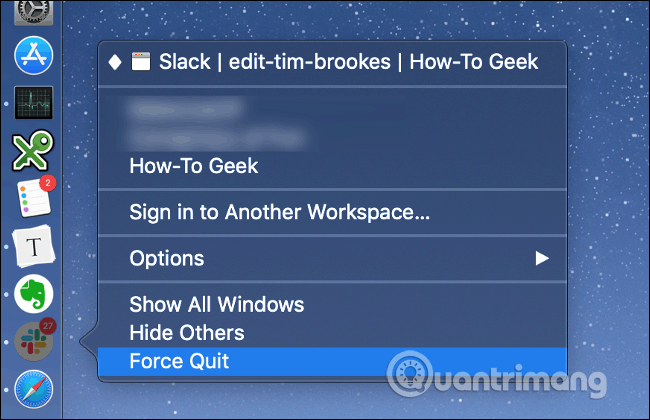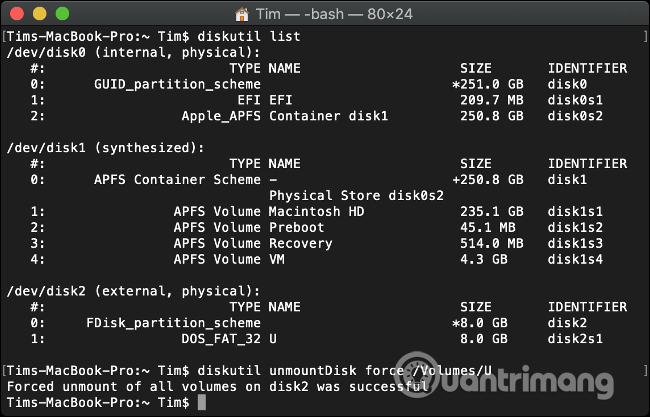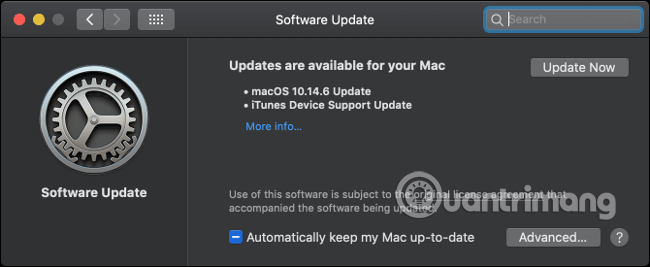How to fix does not turn off the Mac
Macs are like other computers, sometimes unable to boot and sometimes they won't turn off. If you encounter a similar problem, this is a fix.
Instructions for fixing Mac errors cannot be turned off
- How to turn off the Mac
- Software causes problems turning off Mac
- Remove all peripheral devices
- Force restarting Mac
- Prevent future shutdown problems
- Boot in Safe Mode
- Reset SMC and PRAM / NVRAM
- Reinstall macOS
How to turn off the Mac
Turning off the Mac is as simple as clicking the Apple logo on the menu at the top of the screen, then selecting Shut Down . and on the message that appears, select Shut Down again. If you need to quickly turn off your computer, you can hold down the Option button on the keyboard while clicking on the menu option to skip the confirmation dialog.

You need to wait a while for the shutdown process to complete. Even if you select the Reopen windows option when logging back in , you still have to wait for the application and the window is currently closed before Mac shuts down.
If the Mac doesn't turn off, try some of the following solutions.
Software causes problems turning off Mac
Sometimes software can stop Macs from turning off properly. Occasionally, the Mac will notify Application blocked shut down and sometimes not see any errors. First, try closing all applications by right-clicking on the app icon on the dock and selecting Quit .
You can close mandatory or unresponsive applications. Right-click on the application icon, hold down the Option key on the keyboard, then click on Force Quit . Then try turning off the computer again.

If this is not effective, it is possible that a background process is broken and causes a problem. Open Activity Monitor (press Command + Spacebar , then search for it) and click on the CPU tab. You can sort the % CPU column in descending order to see which applications use the most CPU. If it detects a resource-consuming application, click on it, then click the X at the top left to 'kill' the process.
Other applications that crash can be redirected and labeled with a Not responding . You need to click on these applications, then click on X to kill them.
Remove all peripheral devices
Peripherals can also cause problems that cannot be turned off the Mac. You should disconnect all peripheral devices attached to the computer and try again. If you use an iMac, you can try to extract everything except the mouse or Magic Trackpad (although the keyboard doesn't cause problems).
Safely remove all external drives by right-clicking on them and selecting Eject [Drive] or clicking and dragging the volume into the Trash can. If you can't remove the drive, you'll see a new window appear with the Force Eject option .

Alternatively, you can force these drives to be removed via Terminal with the following command (replacing DISK with your drive):
diskutil unmountDisk force /Volumes/DISK To get the list of attached drives, run the following command:
diskutil list Force restarting Mac
If the Mac still doesn't turn off, the last way is to unplug it and force it to turn off. This works on both Mac and Macbook desktops. To do this, first press and hold the Control and Command key, then hold down the Mac power button.
Without the power button, you need to keep Control and Command and the Eject button or Touch ID button. Hold this button for about 10 seconds, then the Mac screen will turn black. Wait about 30 seconds before restarting the computer.
Note: This method is only used as a last resort. The shutdown process is provided to protect the core system files, which need to be properly closed before turning off the computer. The Mac can work properly after a restart, but there is always a risk of doing this. If a problem occurs and the Mac doesn't boot, see the Mac article that won't boot and this is a fix to know how to fix this.
Booting can fix most problems to prevent your Mac from turning off properly. If this problem occurs regularly, you need to understand the root cause of the problem with the steps below.
Prevent future shutdown problems
If the problem is caused by software, you can take some steps to fix the problem. If the application prevents the shutdown process, try checking for software updates to fix the problem. Try booting the Mac without running problematic software.

macOS also need to be updated regularly. You can check for software updates in System Preferences> Software Update . You can enable automatic updates by clicking Advanced . , then tick the corresponding boxes.
Boot in Safe Mode
Restarting the computer in Safe mode can also prevent future problems. When booting the Mac in Safe mode, the boot disk is scanned for problems and macOS will try to fix the problem if any. Safe mode also removes fonts, kernel, system cache and some other things.
To start Mac in Safe mode:
Step 1 . Turn off the Mac (may need to force shutdown).
Step 2. Press the power button, then immediately press and hold the Shift key.
Step 3 . Release the Shift key when you see the logo window and log in as usual.
When restarting the computer, it will boot into normal mode.
Reset SMC and PRAM / NVRAM
The System Management Controller (SMC) is responsible for low-level functions on Macs such as power management, battery charging and keyboard backlight. Sometimes the power problem may be due to SMC, so you should try resetting SMC if you frequently encounter a shutdown problem.
This process is simple but varies depending on the MacBook with an internal battery, using a removable battery or a desktop computer like the iMac.
Reset SMC on a laptop with a non-removable battery
Step 1 . Unplug the power, then turn off the Mac.
Step 2 . Hold Shift + Control + Option on the left, then press and hold the power button. Hold all four keys for 10 seconds, then release.
Step 3 . Plug in the power again and turn on the Mac.
Reset SMC on old Mac laptop with removable battery
Step 1 . Turn off the Mac
Step 2 . Remove the battery
Step 3 . Press and hold the power button for 5 seconds, then insert the battery and plug in the power, turn on the Mac.
Reset SMC on Mac desktop
Step 1 . Turn off the Mac, then remove the power cable.
Step 2 . Wait 15 seconds.
Step 3. Plug in the power again, then turn on the Mac.
Unmovable RAM (NVRAM) or parameter RAM (PRAM) is used on Mac to store settings such as boot disk options, screen resolution and time zone information. Very few NVRAM / PRAM capabilities affect the problem of shutdown but if you still have problems, you should try to reset it.
The process to reset this memory is the same on the boards:

Step 1 . Be sure to turn off the Mac.
Step 2 . Press and release the power button (or Touch ID button on some MacBooks) then immediately press and hold Option + Command + P + R on the keyboard.
Step 3 . After about 20 seconds, you can release these keys and the Mac will boot as usual.
After resetting NVRAM / PRAM, you need to adjust settings such as screen resolution, boot disk and time zone. Now try restarting or shutting down the Mac as usual and see if the problem remains.
Reinstall macOS
When the above methods are useless, you can format the hard drive and reinstall macOS. First, you need to back up your Mac with Time Machine to save the file.
After that, follow the instructions to delete macOS and reinstall the operating system from scratch. You need to store the Time Machine backup and reinstall the used parts.
The new installation not only fixes the shutdown problem, but also solves some other problems caused by the remaining kernel extension and the software is partially uninstalled. You can see the Mac faster and have more free space.
I wish you all success!